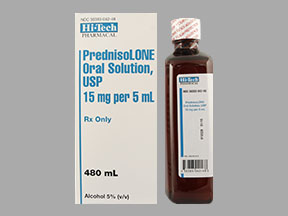
Prednisolone Coupons & Savings Card – Discount Prices from $52.51
Generic for: Millipred
My prescription
Edit
120ML of 15MG/5ML, Prednisolone (1 Bottle)
Select pharmacy

CVS
$71.44
COUPON PRICE
Walgreens
$52.51
COUPON PRICE
Albertsons
$88.51
COUPON PRICE
Walmart
$133.25
COUPON PRICEPrednisolone savings card
Show this card to your pharmacist
Walgreens
$52.51
BIN
ID
PCN
GRP
011867
LHB77F3C7A
HT
LABH001
Powered by
Related corticosteroids prescriptions
More prescriptions for ulcerative colitis
Related corticosteroids prescriptions
More prescriptions for ulcerative colitis
Prednisolone Anhydrous (Prednisolone) dosage forms
Dosage Quantity Price from Per unit 1GM 1 Bottle $27.50 $27.50 1GM 2 Bottles $73.98 $36.99 1GM 3 Bottles $120.47 $40.16 120ML of 15MG/5ML 1 Bottle $70.32 $70.32 120ML of 15MG/5ML 2 Bottles $124.57 $62.28 120ML of 15MG/5ML 3 Bottles $177.71 $59.24
| Dosage | Quantity | Price from | Per unit |
|---|---|---|---|
| 1GM | 1 Bottle | $27.50 | $27.50 |
| 1GM | 2 Bottles | $73.98 | $36.99 |
| 1GM | 3 Bottles | $120.47 | $40.16 |
| 120ML of 15MG/5ML | 1 Bottle | $70.32 | $70.32 |
| 120ML of 15MG/5ML | 2 Bottles | $124.57 | $62.28 |
| 120ML of 15MG/5ML | 3 Bottles | $177.71 | $59.24 |
Prednisolone Warnings
The use of prednisolone requires careful consideration due to several associated safety concerns and potential risks. It is crucial to discuss these with your healthcare provider to ensure safe and effective use of the medication. Below are key points to be aware of:
Increased Risk of Infections: Prolonged or high-dose use of prednisolone can increase your susceptibility to infections and may mask symptoms. Avoid exposure to individuals with chickenpox or measles. For those with a history of tuberculosis, regular monitoring is necessary, and antibiotics might be required. Consult your healthcare provider about vaccinations during treatment, as they might be less effective or unsafe. Report any illness while on prednisolone. Risk factors include concurrent use of immune-suppressing drugs, long-term use, high doses, lack of vaccination, contact with viral infections, history of infections, and receiving live vaccines.
Cardiovascular and Renal Effects: Prednisolone may lead to high blood pressure, fluid retention, and impaired kidney function, potentially exacerbating conditions like hypertension, heart failure, and renal issues. Discuss with your healthcare provider if you have a history of these conditions before starting prednisolone. Risk factors include existing hypertension, heart failure, and kidney problems.
Bone Health Concerns: Long-term prednisolone use is linked to an increased risk of osteoporosis and fractures and can affect growth in children. Pediatric patients on long-term treatment should have their growth monitored. Discuss any concerns regarding bone health with your healthcare provider. Risk factors include high doses, long-term use, being female, history of falls, smoking, and young age.
Adrenal Suppression: Extended use can suppress adrenal gland function, leading to withdrawal symptoms like fatigue and muscle pain if the dose is reduced or stopped abruptly. Consult a healthcare provider before altering your dosage. Risk factors include high doses, long-term use, young age, and stress from trauma or infection.
Ocular Issues: Long-term use increases the risk of cataracts, glaucoma, and certain eye infections. Avoid use if you have herpes simplex of the eye. Report any vision changes to your healthcare provider, and consider regular eye exams. Risk factors include existing cataracts or glaucoma and a history of ocular herpes simplex.
Psychological Effects: Prednisolone can cause mood changes, including depression, mood swings, insomnia, anxiety, or hallucinations. Promptly report these symptoms to your healthcare provider. Risk factors include a history of mental health issues.
Gastrointestinal Risks: The medication can cause stomach irritation, ulcers, and bleeding, especially if combined with NSAIDs or alcohol. Seek immediate medical help for persistent stomach pain or bloody stools. Risk factors include a history of stomach ulcers or bleeding, ulcerative colitis, use of stomach-irritating drugs, and alcohol consumption.
Contraindications:
- Severe Fungal Infections: Do not use prednisolone if you have a systemic fungal infection, as it may pose serious health risks. Always consult your healthcare provider if this applies to you.
Careful adherence to these precautions and regular communication with your healthcare provider can help manage the risks associated with prednisolone use.
Prednisolone Side Effects
Common side effects:
- Nausea
- Headaches
- Dizziness
- Heartburn
- Changes in menstrual cycles
- Increased sweating
- Acne
- Trouble sleeping
Less common but important to monitor:
- Increased susceptibility to infections
- Oral thrush
- Yeast infections
- High blood sugar
- Diabetes or worsening diabetes
Serious side effects:
- Unusual tiredness
- Swelling in the ankles or feet
- Unexpected weight gain
- Vision problems
- Easy bruising or bleeding
- Puffy face
- Abnormal hair growth
- Mood changes such as depression or agitation
- Muscle weakness or pain
- Thinning skin
- Delayed wound healing
- Bone pain
- Stomach or intestinal bleeding
- Red or purple spots on the skin
- Severe allergic reaction
